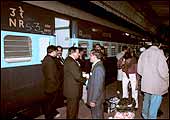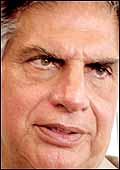 |
| Yoichi Takao (Japan), James Yeh
(China), Ponani and Rodeh: Mensa club |
When the heads of IBM's four research
labs in Asia, India, China, Japan, and Israel congregate in India-the
first such meeting ever-it means something is up. It is. For one,
the meeting signifies the growing importance of the Asian, and the
Indian market. For another, it indicates a desire to work across
the four labs (there are teams that are spread across the four geographies)
to address issues relevant to each. Thus, in India, the labs are
working with some Indian Business Process Outsourcing firms to "develop
technologies where data can not only be read from forms using optical
character recognition (OCR) kind of technologies, but also verified
and entered into databases," according to Michael Rodeh, the
Director of ibm's Israel research lab. If it is BPO-related research
for India, then it is consumer electronics for Japan and local language
computing for China. And in each area, teams spanning the four Asian
labs work with local companies to identify solutions. On the supply
side, this increases the scale of expertise available; Rodeh's lab,
for instance, works on enterprise search and could work on technology
that can help search through the voice calls stored at a call centre.
On the demand side, this signifies IBM's move towards market-driven
research. "There is only so much that efficiency can help competing
companies," explains Ponani Gopalakrishnan, the Head of IBM's
India research lab. "After that, technology has to play differentiator."
Hear, hear!
-Vidya Viswanathan
DASH BOARD
A
Advertisers who bought time on Ten Sports' coverage of the Indo-Pak
series (such as Nokia) have hit the jackpot: access to an extra
40 million homes, courtesy, Doordarshan.
D-
The CEO, COO, and the CFO of its Indian operations quit; there are
reports, and subsequent denials of financial irregularities, and
the company continues to languish at #3. What's up?
REINCARNATION
New Avatar
 |
| Avatar Saini: An ongoing dream it is |
As career decisions go, this was made
in a unique setting, a walk in a cold arid desert in Ladakh. ''It
was a toss up between starting something on my own or joining an
ongoing dream,'' says Avatar Saini, the man responsible for setting
up the Intel India Development Center in 1999. That isn't the only
thing that distinguishes Saini. In his 22-year stint at Intel, he
was part of the team that designed the Pentium and managed the team
that developed the Itanium. For much of 2003, Saini was on a sabbatical
(the trip to Ladakh happened then). He liked what he saw at Topspin,
a 200-employee organisation that has attracted $67 million of venture
funding. True to form, Saini's first task as vice president in charge
of Asia will be to burn $10 million in a R&D centre in Bangalore.
New avatar, same old story.
-Venkatesha Babu
D-Street
Gaffe
Miscounting bids? Give us a break.
The least one expects of people operating
stock exchanges is that they should know their numbers. But that,
as the retail investor's recent experience goes, may be too much
to expect. The Bombay Stock Exchange and the National Stock Exchange
both miscounted the bids the recent IPOs (like those of ONGC and
GAIL) received, thus misleading investors. How did they manage this
incredible feat? By treating multiple bids from the same investor
for the same stock as separate bids and not as one as they should
have. Guess what? Apparently, that's how the two exchanges have
always worked. "This practice (of treating multiple options
as separate bids) is there for several years," says Ranganath
Char of Enam Financial Consultants. That's just one of the chinks
in our stockmarkets' armour. Another anomaly: To participate in
an IPO, a retail investor must cough up the full amount up front,
but an institutional can get by with a mere letter of commitment.
"It is not fair to have separate rules for individual and institutional
investors," says Bharat Kutreja, Vice President, Investors'
Grievance Forum. What will help? Professionalising the broker-driven
BSE. Unsurprisingly, such a proposal is pending approval.
-Narendra Nathan
SOAP-BOX
Convergence DreamsEmami Whips Up A Super Star
 More
than one company chose to use convergence India 2004, India's largest
communications exhibition to make major announcements and unveil
new products. A sampling of the best: More
than one company chose to use convergence India 2004, India's largest
communications exhibition to make major announcements and unveil
new products. A sampling of the best:
 What
is the height of convergence? How about Indian Railways turning
into a ISP (Internet Service Provider)? RailTel-a public sector
undertaking under the Ministry of Railways-plans to open cyber cafes
in all the railway stations in the country, some 4,000-odd. It also
plans to apply for NLD and ILD licences. What
is the height of convergence? How about Indian Railways turning
into a ISP (Internet Service Provider)? RailTel-a public sector
undertaking under the Ministry of Railways-plans to open cyber cafes
in all the railway stations in the country, some 4,000-odd. It also
plans to apply for NLD and ILD licences.
 A
payphone that accepts credit cards? That's right, and MTNL is launching
these sleek devils from Alcatel in the first quarter of 2004-05.
The phones also accept smart cards and calling cards. There will
be 200 such booths in Delhi and Mumbai in Phase I. The only hitch?
MTNL has to find franchises who ensure these phones don't get stolen! A
payphone that accepts credit cards? That's right, and MTNL is launching
these sleek devils from Alcatel in the first quarter of 2004-05.
The phones also accept smart cards and calling cards. There will
be 200 such booths in Delhi and Mumbai in Phase I. The only hitch?
MTNL has to find franchises who ensure these phones don't get stolen!
 The
phone-cum-PDA is still a novelty in India. KT (Korea Telecom) has
partnered with some handheld manufacturers to vend PDAs that double
up as CDMA video-phones, and is currently exploring options in the
Indian market. "It will take a while. We are exploring the
market and talking to service providers," says Young-Sam Lee,
Director, Global Broadband Business Team, KT. The
phone-cum-PDA is still a novelty in India. KT (Korea Telecom) has
partnered with some handheld manufacturers to vend PDAs that double
up as CDMA video-phones, and is currently exploring options in the
Indian market. "It will take a while. We are exploring the
market and talking to service providers," says Young-Sam Lee,
Director, Global Broadband Business Team, KT.
 The
HandyStar (as manufacturer Kori Tech fondly calls it) lets you sing
alongside Kylie Minogue on TV. And record and upload the song on
to your pc. You can also use this to download and play MP3s -a feature
you may not need for a while, as it boasts a library of 3,000 scores
. Other pluses: fm radio and a LCD display. Whew! Price: $175 to
$200. The
HandyStar (as manufacturer Kori Tech fondly calls it) lets you sing
alongside Kylie Minogue on TV. And record and upload the song on
to your pc. You can also use this to download and play MP3s -a feature
you may not need for a while, as it boasts a library of 3,000 scores
. Other pluses: fm radio and a LCD display. Whew! Price: $175 to
$200.
What is BREWing in Ratan Tata's mind? Voice-based instant messaging
and chat applications. Tata Teleservices has allied with Qualcomm
to launch the latter's push-to-talk solutions (marketed under the
brew brand name to service providers). The company is also importing
phones that support push-to-talk applications.
-Sudarshana Banerjee
|
